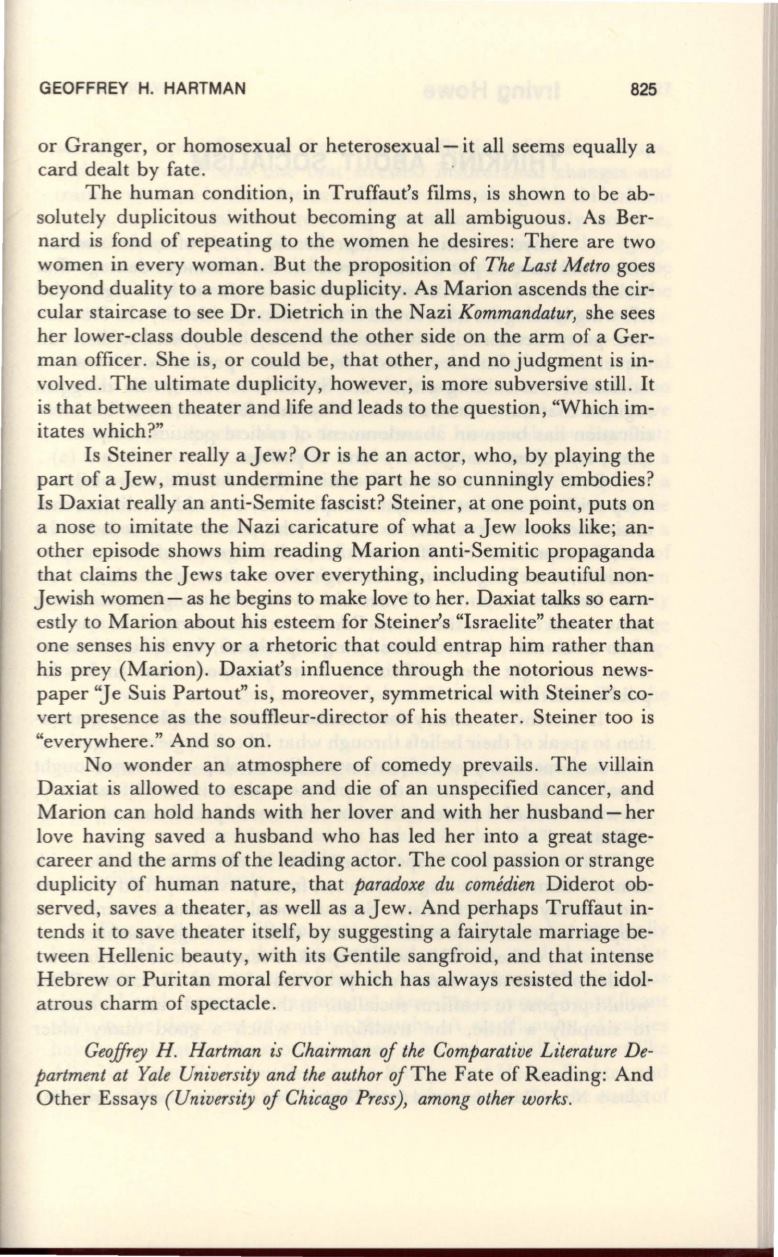
GEOFFREY H. HARTMAN
825
or Granger, or homosexual or heterosexual- it all seems equally a
card dealt by fate.
The human condition, in Truffaut's films, is shown to be ab–
solutely duplicitous without becoming at all ambiguous. As Ber–
nard is fond of repeating to the women he desires: There are two
women in every woman. But the proposition of
The Last Metro
goes
beyond duality to a more basic duplicity. As Marion ascends the cir–
cular staircase to see Dr. Dietrich in the Nazi
Kommandatur,
she sees
her lower-class double descend the other side on the arm of a Ger–
man officer. She is, or could be, that other, and no judgment is in–
volved. The ultimate duplicity, however, is more subversive still.
It
is that between theater and life and leads to the question, "Which im–
itates which?"
Is Steiner really a Jew? Or is he an actor, who, by playing the
part of a Jew, must undermine the part he so cunningly embodies?
Is Daxiat really an anti-Semite fascist? Steiner, at one point, puts on
a nose to imitate the Nazi caricature of what a Jew looks like; an–
other episode shows him reading Marion anti-Semitic propaganda
that claims the Jews take over everything, including beautiful non–
Jewish women-as he begins to make love to her. Daxiat talks so earn–
estly to Marion about his esteem for Steiner's "Israelite" theater that
one senses his envy or a rhetoric that could entrap him rather than
his prey (Marion). Daxiat's influence through the notorious news–
paper 'je Suis Partout" is, moreover, symmetrical with Steiner's co–
vert presence as the souffieur-director of his theater. Steiner too is
"everywhere." And so on.
No wonder an atmosphere of comedy prevails. The villain
Daxiat is allowed to escape and die of an unspecified cancer, and
Marion can hold hands with her lover and with her husband- her
love having saved a husband who has led her into a great stage–
career and the arms of the leading actor. The cool passion or strange
duplicity of human nature, that
paradoxe du comMien
Diderot ob–
served, saves a theater, as well as a Jew. And perhaps Truffaut in–
tends it to save theater itself, by suggesting a fairytale marriage be–
tween Hellenic beauty, with its Gentile sangfroid, and that intense
Hebrew or Puritan moral fervor which has always resisted the idol–
atrous charm of spectacle.
Geoffrey
H.
Hartman is Chairman of the Comparative Literature De–
partment at Yale University and the author of
The Fate of Reading: And
Other Essays
(University of Chicago Press), among other works.


